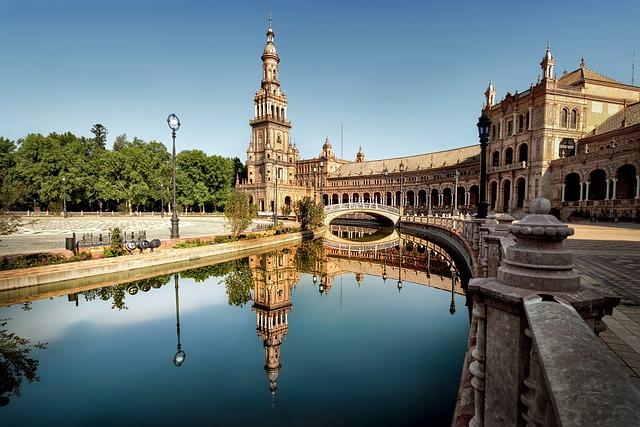In a meaningful diplomatic move aimed at addressing teh ongoing challenges of irregular migration, Spain’s leader has embarked on a high-stakes tour of West Africa, with a particular focus on Mauritania. This visit underscores Spain’s commitment too collaboratively tackling the persistent issue of migrants attempting to reach the Canary Islands, a hazardous journey that has claimed many lives in recent years. By engaging with Mauritanian officials, Spanish authorities are seeking to bolster cooperation on migration management, strengthen border security, and promote stability in the region. As traffic across the Atlantic increases, this initiative comes at a crucial time, highlighting the complexities of migration dynamics and the urgent need for effective, cooperative solutions.
Spain’s diplomatic Efforts in West Africa: A Focus on Irregular Migration
Spain’s engagement in West Africa has intensified as part of a broader strategy to address the growing concerns of irregular migration, notably towards the Canary islands. Through diplomatic visits and high-level discussions, Spanish officials are working closely with countries like Mauritania to create a robust framework for managing migration flows. Key components of this approach include:
- Strengthening Cooperation: Spain is seeking to enhance existing partnerships with Mauritania and other West African nations to tackle the root causes of migration.
- Funding and Support: Increased investment in local economies and capacity-building programs is being discussed to provide alternatives for potential migrants.
- Joint Patrols and Security Initiatives: Collaborative border patrols and joint operations are essential to deter human trafficking and ensure the safety of vulnerable populations.
The situation in West Africa poses significant challenges, and Spain’s proactive measures aim to provide a long-term solution not just for Spain, but for the entire region. to this end, diplomatic engagements have prioritized dialogue around humane migration policies and shared duty.Upcoming discussions are expected to focus on:
| Key Focus Areas | Goals |
|---|---|
| Local Development Projects | Reduce economic drivers of emigration |
| Enhanced Border Security | Combat human trafficking |
| Creating Legal Pathways | Facilitate safe migration |

Analyzing the Causes of Migration from Mauritania to the Canary Islands
The shift of individuals from Mauritania to the Canary Islands stems from a complex interplay of social, economic, and environmental factors. Many Mauritanians face severe economic hardships, driven by high unemployment rates and limited access to quality education and healthcare. This desperation frequently enough compels them to seek better opportunities abroad. Additionally, the enduring effects of climate change have exacerbated these conditions, with declining agricultural productivity leading to increased food insecurity. These environmental challenges are prompting communities to migrate not just internally but also internationally, as families hope to rebuild their lives in more stable regions.
Moreover, political instability and limited governmental support in Mauritania heighten the urgency for migration. The lack of effective governance and persistent corruption hinder economic development and social progress, making life increasingly tough for the youth. In contrast, the Canary Islands are perceived as a gateway to a better future, not only due to their socio-economic conditions but also their ties to mainland Spain. This perception fuels the desire to undertake perilous journeys across the Atlantic. the following table highlights the primary causes behind this migration trend:
| cause | Description |
|---|---|
| Economic Hardship | High unemployment and low wages push individuals to seek work abroad. |
| Climate Change | Environmental degradation affects agriculture, leading to food insecurity. |
| Political Instability | Corruption and ineffective governance create a opposed living surroundings. |
| Possibility Perception | The Canary Islands are viewed as a pathway to better opportunities in Europe. |

The Role of Economic Development in Curbing Migration Flows
Economic development plays a pivotal role in addressing the root causes of migration, particularly in regions like West Africa where socio-economic instability often drives individuals to seek better opportunities elsewhere. By investing in key areas, governments can create an environment that reduces the push factors motivating people to embark on perilous journeys. Job creation, enhanced education systems, and improved healthcare services are essential components of a sustainable economic framework. This approach not only fosters local talent but also encourages people to stay in their home countries, where they can contribute to community growth rather than risking their lives at sea.
Moreover, effective collaboration between countries can amplify these efforts. By establishing partnerships that focus on sustainable development projects, both the source and destination nations can work towards a common goal of reducing illegal migration. Such as, initiatives could include:
- Infrastructure improvements to facilitate trade and job growth.
- Microfinance programs that empower local entrepreneurs.
- Skills training tailored to the local market demands.
Such measures not only enhance local economies but also align with broader global migration policies aimed at humanitarian solutions. As economic stability rises, the allure of irregular migration lessens, creating a more balanced approach to migration management.

strengthening Cooperation: Spain’s Agreements with Mauritania
The recent agreements between Spain and Mauritania mark a significant step in enhancing bilateral cooperation, particularly in the context of addressing irregular migration across the Atlantic. This collaboration focuses on a multifaceted approach, aiming to improve safety and legal channels for migration while enhancing the capabilities of Mauritania’s border control and maritime surveillance. Key elements of the agreements include:
- Joint Patrols: Coordinated efforts to monitor and control territorial waters, thereby reducing smuggling and trafficking.
- Capacity Building: Training and resource provision for Mauritanian authorities to strengthen their immigration management.
- Community Engagement: Initiatives aimed at informing local populations about the risks of irregular migration.
- Economic Development: Investments in local economies to address the root causes of migration through job creation and educational opportunities.
In terms of outcomes, these frameworks are expected to improve not just migration management, but also foster economic cooperation between the two nations. Spain aims to work closely with Mauritania to ensure a balanced and fair system that respects human rights while combating illegal activities. An illustrative overview of the scheduled cooperation efforts includes:
| Initiative | Description | Expected Outcome |
|---|---|---|
| Border Security Enhancements | deployment of advanced surveillance technology at key points. | Reduced illegal crossings and improved detection rates. |
| Legal Pathways for Migration | Creation of programs for safe and lawful migration. | Increased legal settlement options for Mauritanians. |
| Social Awareness Campaigns | Community outreach to disseminate information about migration risks. | Empowered communities making informed decisions. |

Humanitarian Perspectives: Supporting Migrants and host Communities
The ongoing crisis of irregular migration from West Africa to the Canary Islands necessitates a thorough approach that considers both migrants and the host communities they encounter. During Spain’s recent diplomatic efforts in Mauritania, there was a notable emphasis on improving the conditions for migrants as well as providing support for the local populations affected by these migratory flows.This dual-focus strategy seeks to address the root causes of migration, promoting safer pathways and creating economic opportunities in both the sending and receiving regions. By engaging with local stakeholders, Spain aims to foster resilience among communities that frequently bear the brunt of these pressures, ensuring that both migrants and residents can coexist harmoniously.
Key initiatives proposed during the tour include:
- Capacity Building: Training and resources aimed at improving local governance and public services to better support the influx of newcomers.
- Economic Development: Projects designed to create jobs and stimulate local economies, benefiting both migrants and native populations.
- Strengthened Borders: Collaboration on border management to enhance safety and reduce the risks associated with irregular migration.
Table summarizing the initiatives:
| Initiative | Description |
|---|---|
| Capacity Building | Training for local officials to manage migrants more effectively. |
| Economic Development | Job creation programs that support both communities. |
| Strengthened Borders | Enhanced security measures to manage migration flows safely. |

Recommendations for Sustainable Migration Management in the Region
As leaders engage in discussions surrounding the complex issue of irregular migration, it is crucial to implement multifaceted strategies that address both the root causes and immediate factors driving this phenomenon. Sustainable migration management must focus on enhancing economic opportunities in migrant-sending regions, developing educational initiatives, and fostering community resilience.Governments should prioritize partnerships with local organizations to promote job creation, skills training, and entrepreneurship programs, which can substantially reduce the economic pressures that compel individuals to migrate irregularly. Support for infrastructure development, including access to essential services like health care and education, is also imperative to create a stable environment for potential migrants.
moreover,regional cooperation is essential in crafting comprehensive migration policies that respect human rights while ensuring border security. Creating a coordinated response among West African nations and their European counterparts can facilitate effective information sharing, joint operations, and strategic resource allocation. It is vital to consider the following recommendations to enhance collaborative efforts:
- Strengthening Bilateral Agreements: Develop agreements focused on regular migration pathways and labor migration.
- Investing in Community Programs: Fund initiatives that empower communities to reduce vulnerability to migration.
- Enhancing Law Enforcement Training: equip local authorities with better skills to address trafficking and smuggling networks.
- Raising Awareness: Launch campaigns to educate potential migrants on safe migration options and the risks of irregular journeys.

Insights and Conclusions
Spain’s leader’s recent tour in Mauritania underscores the urgent need for collaborative efforts to address the complex issue of irregular migration to the Canary Islands. By engaging with key West African partners, Spain aims to not only stem the tide of migration but also foster sustainable solutions that address the root causes driving individuals to embark on perilous journeys. The dialogues initiated during this visit could pave the way for more comprehensive policies aimed at enhancing border security,improving local conditions,and providing pathways for legal migration.as the situation in the region continues to evolve, the outcomes of this tour will be closely watched, serving as a critical barometer for future cooperation and migration management strategies between Spain and its West African neighbors.







